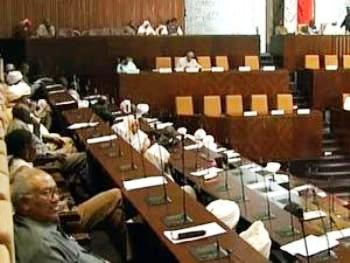Sudan’s SPLM calls new security law a ‘bad sign’
December 20, 2009 (KHARTOUM) – The former Southern rebel group blasted the passage of the National Security bill in the parliament today despite objections it raised along with other opposition parties on portions of the new law.

The contentious point in the law revolved around the powers of the National Intelligence and Security Services (NISS) in arrest, search, seizure and length of detention.
Opposition parties say that the Comprehensive Peace Agreement (CPA) limited the NISS role in gathering and analyzing intelligence with executive powers assigned to law enforcement and judiciary.
However, the ruling National Congress Party (NCP) argues that the security organ will not be able to function efficiently without the power to arrest and detain suspects.
The official spokesperson of the SPLM-led government in Southern Sudan, Paul Mayom Akech, on Friday warned that the party would consider the possibility of withdrawing its component from NISS unless the controversial powers were removed from the national security organ.
“Will we continue to maintain our component in the national security?” he asked.
Some SPLM officials on Sunday, after the endorsement of the law by parliament in its controversial form, said the First Vice President of Sudan and the party’s chairperson, Gen. Salva Kiir Mayardit, would not sign to the law in the Presidency.
The SPLM deputy Secretary General in the Northern sector Yasir Arman said the new law is a violation of the CPA and the constitution slamming the use of the NCP’s majority to endorse the bill in the national assembly.
Arman said that the arrests to opposition leaders in the past means that the April 2010 elections will be conducted “under the control of the NCP”.
The SPLM figure urged “democratic forces” in Sudan to continue their struggle to counter the security law adding that the NCP “must pay the price of these measures in the elections” adding that what happened today constitutes “a bad sign” for any fair and free elections.
He further said that the country is now effectively run under emergency law.
NCP official Ibrahim Ghandour defended the bill, saying the reduction in detention times marked a significant reform.
“We are living in a world where everybody is talking about terrorism. That is why we need a security authority with the powers of detention,” he told Reuters.
“How do you gather information without detaining a person?”
The SPLM and NCP have managed to resolve a number of long standing disputes on a number of laws particularly the referendum bill that have created a state of tension in the country. The SPLM along with Northern opposition parties have twice attempted to stage demonstrations this month that were curbed by Sudanese authorities.
(ST)
